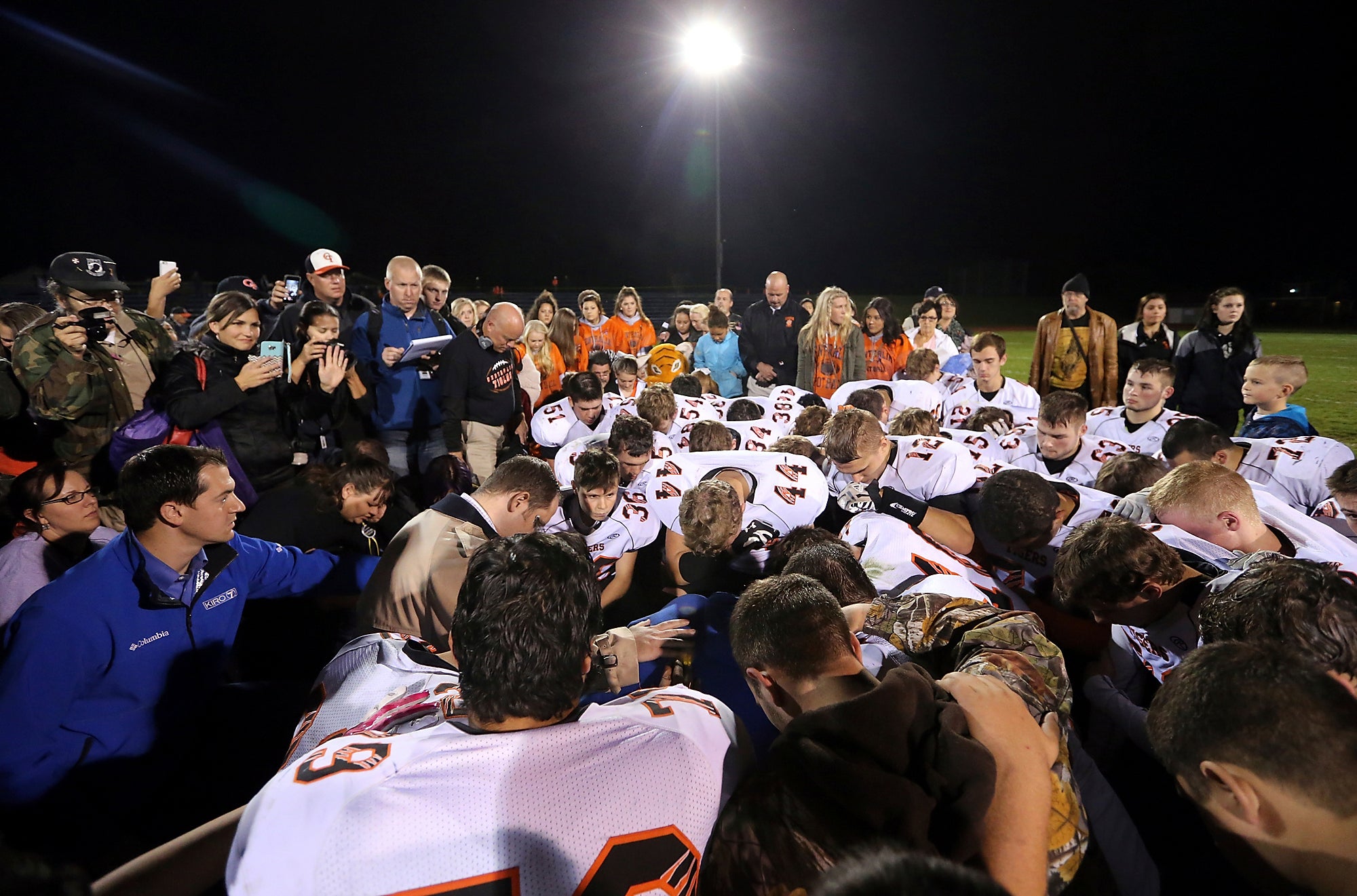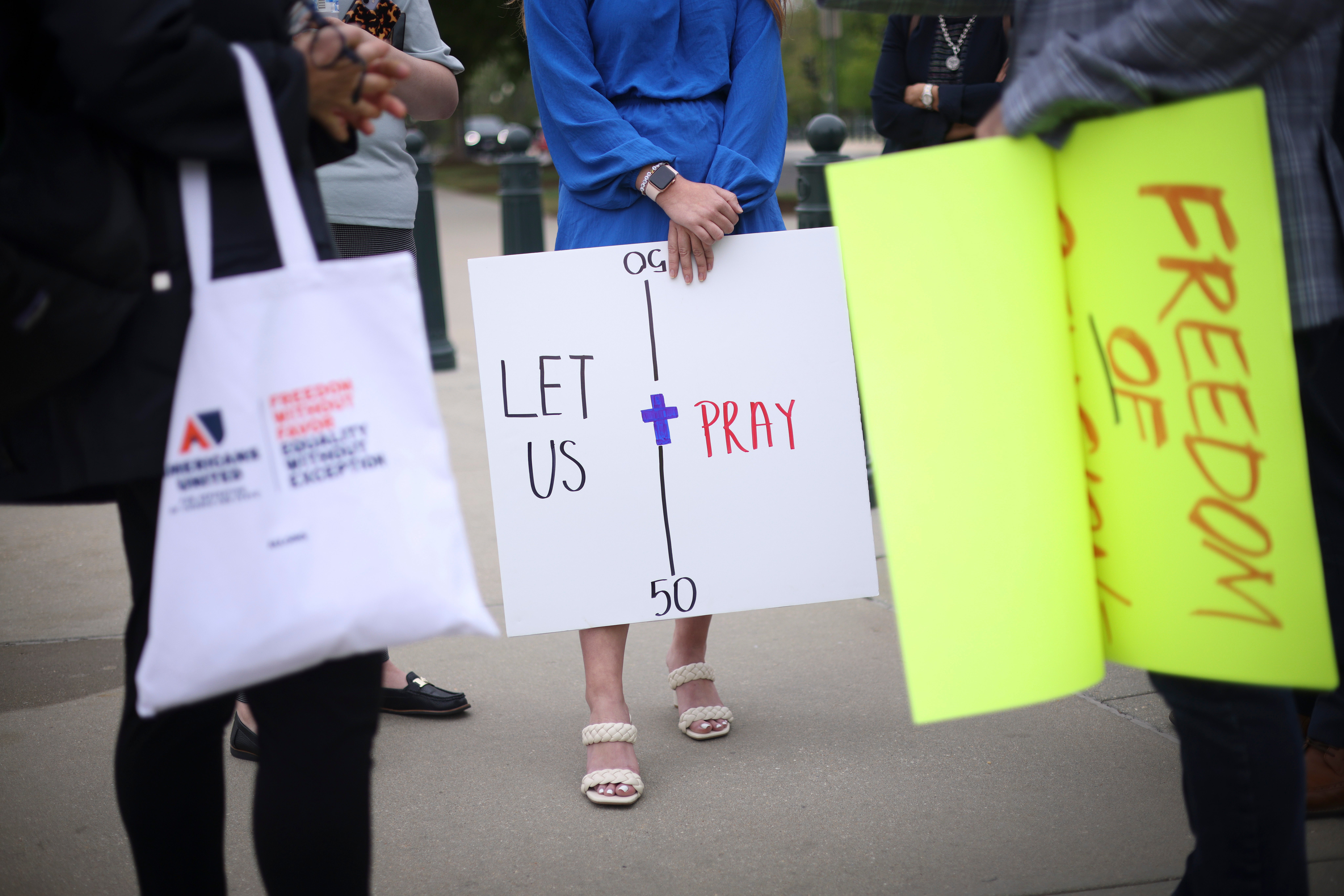Why this Supreme Court case could result in ‘the greatest loss of religious freedom in generations’
A case involving a high school football coach’s mid-field prayer could threaten ‘church and state’ protections, civil rights groups and religious leaders warn
Your support helps us to tell the story
From reproductive rights to climate change to Big Tech, The Independent is on the ground when the story is developing. Whether it's investigating the financials of Elon Musk's pro-Trump PAC or producing our latest documentary, 'The A Word', which shines a light on the American women fighting for reproductive rights, we know how important it is to parse out the facts from the messaging.
At such a critical moment in US history, we need reporters on the ground. Your donation allows us to keep sending journalists to speak to both sides of the story.
The Independent is trusted by Americans across the entire political spectrum. And unlike many other quality news outlets, we choose not to lock Americans out of our reporting and analysis with paywalls. We believe quality journalism should be available to everyone, paid for by those who can afford it.
Your support makes all the difference.A public high school football coach in Washington state gathered players at the 50-yard line to kneel, bow their heads and pray. The school district repeatedly asked him to move his prayer to somewhere less conspicuous, as to avoid the appearance of the school’s endorsement of a religious view.
He refused and argued that the school violated his religious freedom, and a prominent right-wing legal group took up his case, which is now before the US Supreme Court.
The case of Kennedy v Bremerton School District could have far-reaching consequences beyond the football field, potentially shrinking core First Amendment protections that prevent the government from imposing religious views.
Joe Kennedy’s case, represented by lawyers from the conservative First Liberty Institute, raises questions about government workers’ rights to free speech and their free exercise of religion against long-running precedent that prevents that speech from pressuring students and others to join.
Supreme Court precedent has roundly rejected public school-sponsored religious activity as unconstitutional coercion, as schools and school officials maintain enormous influence over students, whether “subtle and indirect” or otherwise, according to the court’s 1992 ruling in Lee v Weisman.
But a new conservative majority on the nation’s high court has signalled a willingness to rule in favour of the coach after hearing opening arguments on 25 April.
Rachel Laser, president of Americans United for Separation of Church and State, a religious freedom advocacy group on the legal team defending the school district, said in a statement that if the Supreme Court “gets this case wrong, we could witness the greatest loss of religious freedom in generations.”
“We’re on very dangerous ground if the court is considering overturning decades of established law that prevents government employees from pressuring students to pray in public schools,” she said. “The facts of the case, the laws of our country, and religious and nonreligious Americans alike are on the side of protecting students’ religious freedom.”
The “establishment clause” of the First Amendment prohibits the government from both imposing or discouraging religious beliefs.
Ouida Brown, general counsel for the Christian Methodist Episcopal Church, said during a briefing in support of the school on Monday that such protections ensure “that the government can’t tell us how to practice our faith or whether you have to practice any faith at all.”
“We must be free to believe as we choose, so long as it does not harm anyone else. We are not truly free unless we can make our own decisions about religion,” she said.

School prayer guidance that was issued in 2020 by the US Department of Education under then-President Donald Trump’s administration states that “school employees are prohibited by the First Amendment from encouraging or discouraging prayer, and from actively participating in such activity with students.”
Mr Kennedy joined the Bremerton High School varsity football team’s coaching staff in Washington state in 2008. He was eventually placed on administrative leave after refusing the school’s accommodations for his public prayer. When his contract was up, he did not reapply after the 2015 football season.
He filed a lawsuit in US District Court, though his challenge was rejected in lower-court rulings that argued he cannot claim First Amendment protections because he acted as a public employee while on the job.
His argument also reframes public school prayer as a protected speech to be exercised by teachers – who are presented as victims of religious discrimination if restricted from doing so – rather than as a form of government-sanctioned speech imposed on students.
He told reporters outside the court on Monday that he is optimistic that the court will determine “exactly what the facts are and apply the law without any of the biases out there.”
His arguments have prompted a series of filings in support of the school district from clergy and religious organisations, members of Congress, civil rights groups, teachers unions, school districts and public employees, and 13 state attorneys general, among others, to challenge his version of events, which a lower-court judge called a “false” and “deceitful narrative”.
Lawyers and lower-court rulings have argued that Mr Kennedy and his attorneys – who have argued that he was only leading a “brief, quiet prayer” – have misrepresented his actions.
“One of my problems in this case is that the parties seem to have different views of the facts,” said Justice Stephen Breyer.
The moments on the field became media spectacles; he invited members of the press and state legislature to attend, he appeared on national television programmes to defend his actions, and his supporters in the stands became so disruptive that a federal appeals court called the storming of the field at one game a “stampede” that knocked over marching band members.
A ruling from the 9th Circuit Court of Appeals argued that the coach “insisted that his speech occur while players stood next to him, fans watched from the stands, and he stood at the center of the field.”
At least one student athlete felt pressured to join the prayers, fearing that he would not be able to “play as much if he didn’t participate,” according to court filings.
Pulling student athletes into prayer during a school-sanctioned event under leadership from their coach “kind of puts undue [pressure] on students to participate when they may not wish to,” according to Justice Elena Kagan.
“They feel like they have to join religious observations they don’t wish to join,” she said during opening arguments on 25 April.

In a briefing outside the Supreme Court, Rev Kathleen Kingslight from Bremerton’s St Paul’s Episcopal Church said “if he takes the knee, they will take the knee. If he prays at the 50-yard line, a powerful symbol … they will do the same.”
“The kids follow the coach’s leadership because of his power, because of his influence. If they have a belief that is different … will those kids let go of their own faith so they can support the coach?” she said.
Rev Gregory Reffner, a pastor at Brownsville United Methodist Church in Bremerton, said that “the possibility of public high school students having to wonder whether or not they will receive consequences if they did not in a participate in a post-game huddle and prayer says to me that the separation of church and state is being threatened.”
The American Civil Liberties Union argues that the school, in negotiating a more appropriate setting for his prayer, “did only what was required of them by the First Amendment: They protected students’ religious freedom by shielding them from school-sponsored religious exercise.”
The Supreme Court initially looked at the case in 2019 as it made its way the the courts, though four conservative justices – Samuel Alito, Clarence Thomas, Neil Gorsuch and Brett Kavanaugh – argued that an appeals court’s “understanding of the free speech rights of public school teachers is troubling and may justify review in the future.”
In two hours of oral arguments on Monday, the Supreme Court’s conservative justices signalled that they could side with Mr Kennedy, with Justice Samuel Alito also appearing to suggest that the district fired Mr Kennedy for “unlawful” reasons.
Justice Alito suggested that schools treat religious expression by teachers no differently than the expression of their political views.
“Suppose what Coach Kennedy did was go out on the field after the game and wave the Ukrainian flag?” he asked.
Justice Gorsuch said one of the “difficulties” in the case is “getting one’s hands around the district’s rationale.”
Conservative Justice Brett Kavanaugh expressed concern for a player who felt pressured to join, believing that “if I don’t participate in this, I won’t start next week.”
“Every player is worried about playing time,” he said.
Paul Clement, an attorney for Mr Kennedy, argued that the case is not one in which the school took action because of concerns that students were “coerced” into prayer.
“The record is crystal-clear that they were concerned about endorsement,” he said. “When the coach is by himself at the midfield giving a 15-second fleeting prayer … if you call that coercion, you are making an important category mistake.”
Justice Kavanaugh also posed a hypothetical in which a coach made the sign of the cross during a game, suggesting that group prayer would be similarly protected.
Richard Katskee, a lawyer representing the school district and a legal director with Americans United, argued to the justices that personal expression such as making the sign of a cross is much different that playing oneself as “the center of attention” in the middle of the field.
“I don’t know how we could write an opinion that would draw a line based on not making yourself the center of attention as the head coach of a game,” Justice Kavanaugh said.
The court is expected to issue a ruling in the case this summer.



Join our commenting forum
Join thought-provoking conversations, follow other Independent readers and see their replies
Comments